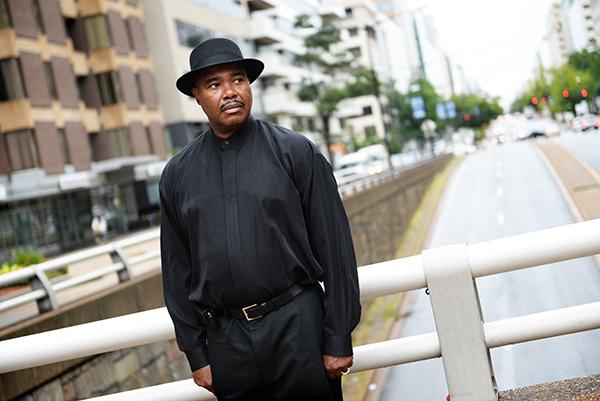A judge ruled in GW’s favor in a lawsuit filed by a former University Police Department supervisor who allegedly harassed fellow officers.
Todd Ladson sued GW for racial and age discrimination more than two years ago, after he was fired in 2013. The judge dismissed the case because Ladson did not provide substantial evidence of racial and age discrimination, according to the opinion issued Sept. 1.
The body of evidence provided by GW showed that the 24-year veteran of the department was fired for sexually harassing female officers about their sexuality and creating “a hostile work environment for his colleagues,” according to the opinion.
The opinion, written by U.S. District Court judge Amit Mehta, refutes Ladson’s claims that he was fired for “subjective” reasons, that his University investigation was “one-sided” and that white officers were punished more leniently for similar conduct.
“[Ladson] has not offered a shred of evidence that would allow a reasonable jury to conclude that he was terminated because of racial discrimination, rather than due to the numerous acts of sexual harassment that his employer found him to have committed,” Mehta wrote in the decision.
He added that Ladson did not allege age discrimination in the court process, so the court will not count his age discrimination claim, according to the document.
Ladson originally asked for $1 million in the suit to make up for lost pay and for the emotional distress he suffered after being fired.
University spokeswoman Maralee Csellar declined to comment further on the decision. Ladson could not be reached for comment on the case.
Tiffany Justice, an officer working under Ladson in UPD, filed a sexual harassment complaint to GW against in March 2013 because he allegedly made “lots of racist and sexually graphic” comments to her that “impacted her safety, her environment, her work performance” and the culture of the shifts that he supervised, according to the opinion document. He was then in a supervisory role as a master patrol officer.
Justice claimed that Ladson suggested that she had sexual relations with another officer, Linda Queen. Ladson allegedly warned new officers in the department that the new officer will “have men and women after her,” according to the document.
Queen settled a sexual harassment lawsuit against GW in the spring, after claiming Ladson made sexual jokes in front of her and that two other supervisors harassed her, allegedly keeping her from getting promoted.
Ladson alleged that the UPD witnesses testifying against him lied because they were jealous that he was a “popular” and “happy-go-lucky person,” according to the decision.
The University’s assistant Title IX coordinator at the time, Tara Pereira, began an investigation into Ladson’s alleged harassment after Justice’s complaint. She interviewed 13 witnesses and met with Ladson and his union representative multiple times, according to the opinion.
Pereira, who declined to provide additional comment on the suit, described Ladson’s behavior as “one of the most significant sexual harassment cases” that she has seen, according to the decision.
After Pereira found that Ladson’s behavior was “long-standing” and affected numerous officers, then-UPD chief Kevin Hay met with Pereira, Ladson and a union representative. The group did not find an appropriate way to address Ladson’s behavior, so Hay arranged a formal University hearing, which began Aug. 1, 2013. The hearing’s panel included Chris Bracey, a law school professor who is now the vice provost for faculty affairs, and Kimberly Acquaviva, an associate professor of nursing and then-director of faculty development.
In the panel, Justice testified that Ladson told another female officer’s parents that their daughter was in a relationship with Justice. Octavia Livingston, a UPD security officer, testified that Ladson “did not approve” of LGBT individuals and told her she should not have sexual relationships with other women, according to the document.
In front of the panel, Ladson offered a “blanket denial of all allegations” as his opening and closing statements and did not provide any witnesses in his favor, although he was given “multiple opportunities” to do so, according to the opinion.
Ladson’s lawyer, A.J. Dhali, said in an email that the special University panel investigating Ladson is a “sham” and a “kangaroo panel,” adding that he believes 95 percent of panels do not end in employees’ favors. Dhali added that the panels follow a “flawed” system that did not allow Ladson to seek legal counsel.
“If a GWU employee is interested in pursuing his or her action in court, the employee is better off without attending a panel hearing,” he said.
He added that he and Ladson disagree with the judge’s decision against them but that they are “respectful of its findings.”
In his complaint, Ladson had defended his actions, saying that white officers were not punished as harshly when they made similar remarks. The officers he mentioned — George Brittle, Reed Jones and Christopher Brown — were not fired for allegedly making controversial remarks.
Mehta analyzed the details of each of the officers’ cases and concluded that Ladson’s actions were not comparable to Jones’ and Brown’s offenses, who allegedly used “racial slurs” and asked an officer on a date, according to the opinion.
The judge found that Brittle, who allegedly referred to a female officer by her badge number “69” in 1991, does not constitute a valid comparison because the actions did not occur during Hay’s tenure as chief.







